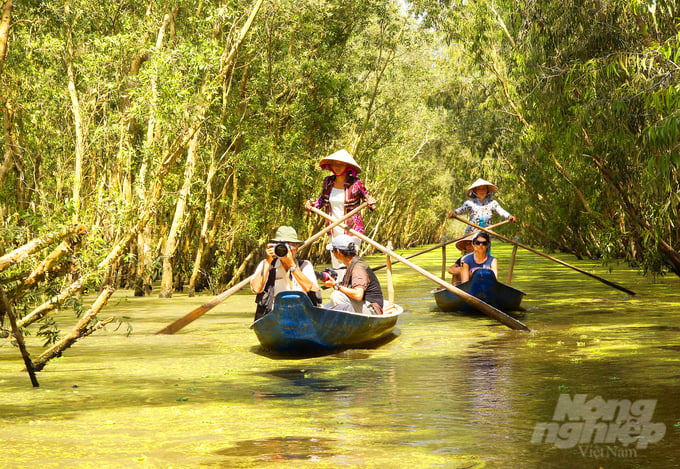November 27, 2025 | 21:09 GMT +7
November 27, 2025 | 21:09 GMT +7
Hotline: 0913.378.918
November 27, 2025 | 21:09 GMT +7
Hotline: 0913.378.918

Tra Su Melaleuca forest, located in An Giang province, is part of Vietnam's special-use forest system and was designated as a landscape protection area in 2005. Photo: Le Hoang Vu.
An Giang Department of Agriculture and Rural Development, in collaboration with WWF, is implementing this project to restore wetlands and natural processes in the Mekong Delta through measures to rehabilitate special-use and protective Melaleuca forests in the Tra Su Melaleuca forest landscape protection area in Tinh Bien town.
The project will focus on researching and implementing scalable Nature-based Solutions (NbS) with potential for large-scale investment throughout the upper Mekong Delta. This will contribute to the overarching goal of conserving the biodiversity of Vietnam's freshwater ecosystems while ensuring sustainable livelihoods for local communities.
Tra Su Melaleuca forest, located in An Giang province, is part of Vietnam's special-use forest system and was designated as a landscape protection area in 2005. With a core conservation area of 845ha and a buffer zone of over 1.100ha, this area annually receives floodwaters directly from the Mekong River during the rainy season, helping to maintain the natural seasonal wet-dry cycle of the wetland. The main habitats of Tra Su include Melaleuca forest, swamps and grasslands. The flora in Tra Su is diverse, with 140 species, most notably the melaleuca trees and a dense layer of floating water plants.
The fauna in this area is also quite rich, with at least 70 recorded bird species, including two species listed in Vietnam's Red Data Book: Mycteria leucoce (a stork species) and the oriental darter (snakebird). There are 11 species of mammals, including rare bats, and at least 25 species of reptiles and amphibians. Additionally, the forest is a year-round habitat for 10 native fish species and 13 migratory fish species during the flood season, two of which - Chitala ornata (scientific name) and white catfish - are endangered.
According to Mr. Nguyen Duc Duy, Deputy Director of the An Giang Department of Agriculture and Rural Development, the Mekong NbS project is being implemented from 2023 to 2025 to protect and restore wetland habitats and the natural processes of the delta, such as free-flowing water, sediment accumulation, and silt deposition in the buffer zone.
Through the implementation of various activities in and around the Tra Su Melaleuca Forest, the project aims to provide significant support to the Tra Su Forest Management Board. This includes planting 60ha of new forest and nurturing 100ha of degraded forest, focusing on the restoration of habitats and native species. The project will employ effective management strategies and hydrological regulations tailored to the specific needs of each sub-zone, ensuring that biodiversity in the core area is adequately protected and monitored. Furthermore, outside the buffer zone, flood-based livelihood models will be introduced. These models are designed to offer not only economic benefits but also environmental advantages, while simultaneously fostering the involvement and support of local communities for sustainable development in the region.
Translated by Phuong Linh

(VAN) According to Mr. Vo Minh Thanh, Director of the Tay Ninh Department of Agriculture and Environment, Resolution 57 has created a new development pathway for the locality, shifting from traditional toward modern agriculture.
/2025/11/26/4909-2-154329_878.jpg)
(VAN) Pearl grouper farming in HDPE cages not only delivers economic efficiency but also contributes to protecting the environment, creating jobs, and promoting marine-based experiential tourism.

(VAN) The model of making a living under the forest canopy through the agroforestry system in Van Son commune, Bac Ninh province, is expected to generate an annual income of approximately VND 30 million/ha.

(VAN) Many enterprises in Can Tho are harnessing natural energy and reducing greenhouse gas emissions in their production processes, thereby contributing to the promotion of a sustainable green transition.
/2025/11/24/3536-2-112800_176.jpg)
(VAN) Dong Nai now has tens of thousands of hectares of forests certified for sustainable management, and this area will continue to be expanded in the coming period.

(VAN) Vinh Ha hamlet (Dai Xuyen commune, Hanoi) is shifting away from small-scale farming as households adopt bioscurity into their breeder chicken models.

(VAN) Heavy rains make aquatic species more vulnerable to disease. Proactive water management and high-tech systems help farmers prevent outbreaks and protect yields.